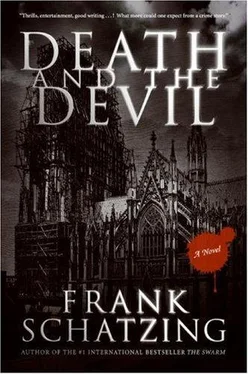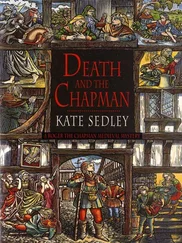“Traitor!” said Daniel hoarsely. Without so much as a glance at Kuno, he wiped the blood from his upper lip, picked up his sword, and rejoined the procession, limping.
Kuno watched him go. Then he became aware of all the eyes on him. He straightened up, turned his back on the crowd, and not without a certain dignity, strode away in the opposite direction.
“He loved him, too much,” muttered Johann.
“Yes, he loved Gerhard,” said Matthias out loud, turning to the people around. “And Daniel loved him, too. Love made them blind and each thought he was closest to him. Thus love can engender hatred and turn friends into enemies. Forgive them. Now let us go and pay our last respects to Gerhard.”
Strangely, the crowd seemed happy with the explanation he had quickly cobbled together. As if Daniel had ever felt anything like love for Gerhard! They all set off again together.
Johann moved next to him. “Well lied,” he said.
“Sweet bleeding Jesus!” Matthias exclaimed, contrary to his usual dislike of strong language. “If Kuno goes on like this, we’ll all be saying our last prayers.”
Johann was silent for a while. Eventually he said, “He will not go on like that.”
“It’s easy enough to say that! And what about your mad son who almost split the other madman’s head open? These things have got to stop, Johann.”
“They will stop.”
Matthias muttered a few more curses. The procession was slowly approaching the cathedral. The sound of the bells made their whole bodies vibrate.
They will stop—
Matthias could not let the matter rest. “What do you mean by that?”
“I spoke with Mother yesterday evening. We discussed Kuno. She suggested I read the Bible.”
“Blithildis!?” said Matthias. “What’s wrong with her? She usually gives rather more practical advice than that. I can’t believe she’s getting soft in her old age. After all, it was her idea to—”
“Shh.” Johann placed a finger to his lips.
“Sorry,” Matthias mumbled.
“She recommended the Psalms because there’s a passage she felt fit the situation. How well do you know your Bible?”
“I know my account books better.”
“As was to be expected. Psalm one hundred and nine, verse eight.”
Matthias’s brow furrowed. “No idea.”
“Neither had I. So I went and looked it up to see what Mother’s advice was.”
“And?”
Johann gave a deep sigh. “It is very clear: Let his days be few —”
Matthias let out a low whistle. “That’s what she thinks, is it?”
“— and let another take his office. ”
Urquhart was standing under the lime trees, watching the market. He knew that his instructions had been too much for the servants’ simple minds. He had positioned them around the city on the chain principle. It was a strategy they used in the Scottish Highlands to communicate over long distances. They were divided into pairs and each kept an area under observation, just within view of the next pair. They carried a torch with them, and when they saw the enemy, one of them held it aloft so that the flame and the inevitable greasy black smoke could be seen from a distance. Sword in hand, the other would approach the enemy, assuming there were not too many, then retreat in order to lure them toward his other comrades. They in their turn would light their torches, that being the signal to close up. Carried out competently, this maneuver allowed a scattered group of warriors slowly to surround an enemy, who would keep on chasing after a different man until they realized too late they had fallen into a trap.
Accordingly Urquhart had divided the servants up into pairs. Since, in the city, they could not rely on keeping the next pair in sight, the aim was to drive the redhead, once he had been spotted, toward the other pairs, until they had him trapped. A simple plan, one would have thought.
Matthias’s servants had stared at him openmouthed. He had had to explain the principle several times. By the time they had understood it, they had forgotten the color of Jacob’s hair or what he looked like. Urquhart repeated his explanations patiently, but he found their stupidity infuriating. If, as appeared to be the case, Jacob had at least a modicum of common sense, he would make himself unrecognizable. His only hope was that Jacob would make a mistake.
At the moment one pair was keeping Haymarket under observation, one Old Market Square, and a third the area around the cathedral site. Six men for at most one-tenth of the city. There was no other way. He had to station most of his men in the crowded parts of the city. Three other pairs were patrolling the area between St. Severin’s and the Brook, from the Church of the Apostles past New Market Square as far as St. Cecilia’s and the district around St. Ursula’s and Eigelstein Gate.
Urquhart put them out of his mind. He hoped Matthias’s contact would be able to post soldiers at the city gates.
His only reassurance at the moment was the tiny crossbow he could feel under his cloak. He strolled across Haymarket, studying faces. The market was in full swing. He walked along the meat stalls, submitting each man he passed to a few seconds of highly concentrated scrutiny. He worked to a set scheme, which allowed him to register the essential details, categorize and assess them before acting or proceeding to the next. It was a skill acquired through years of practice; he could not have explained how he went about it. Urquhart was far from being vain, but there was hardly anyone he had come across who was capable of seeing patterns as he could; very few could even think logically. People perceived things as if through a haze, and the haze was called religion.
This worked to his advantage. Urquhart believed in nothing. Neither in God, nor the Devil. He didn’t even believe in the value of his own or any other existence.
Perhaps, he thought, as his eyes captured another face, analyzed and released it, this architect would have been a man he could have talked to, a man with whom he could have shared a jug of wine and a few jokes about their fellow men. What he had seen of the cathedral under construction had inspired his respect. If it did actually represent the overall plan, he had a logical structure before him. For the ring of chapels around the apse, that steeply soaring, straining caricature of perfection, was cold. Its mathematical precision took the life out of any inspiration.
Capture, analyze, release.
A little farther on was the part of the market where offal was sold: liver, heart, and tripe, kidneys and sweetbreads. He elbowed his way through and watched the butchers as they weighed handfuls of pale white or blue-and-red-veined collops, strings, and folds, and passed them to the customer. One rummaged around in a mass of undefined entrails and pulled out a long, tangled intestine. The pile started to move, pieces slithering over each other like skinned snakes, bodies still warm and twitching. He saw the butcher’s arm plunge back into the mass, again and again, presumably the pieces on offer were too long, too short, too thick, or too thin. Again and again the man plunged his hand into the moist pile and pulled something out—
The world turned red.
He saw a man in armor, an iron claw descending and pulling something out of the body of a child, something warm, gleaming, sticky. The child was still alive. It must be making the high-pitched, unearthly shrill sound, and all about him—
His head was pounding.
Urquhart closed his eyes and pressed his fists to the sides of his head.
The image faded.
“What’s wrong? Don’t you feel well?”
He blinked. He was at the market. It was just the entrails of dead animals.
Читать дальше












